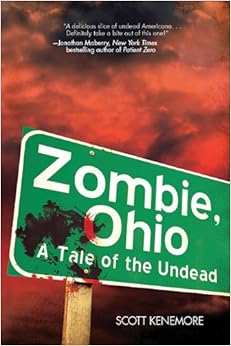Film:
Andrew Currie’s Fido presents a bit of a departure from the films that we have
added to the Canon of the Dead so far (28
Days Later and the works of George A. Romero). Unlike the vast majority of
zombie films (and zombie narratives, in general), Fido is not a horror film. However, what it lacks in scares and
suspense, it more than makes up for with style and wit. This is a beautifully
shot and extremely well-executed film, an almost point perfect parody of 195os
TV series like Lassie, Leave It to Beaver, and Peyton Place. What makes Fido so good, though, as a zombie text
is the way it manages to seamlessly integrate zombies into a pre-existing mode
of filmic representation (I’m hesitant to refer to it as a genre; perhaps “era”
is more appropriate).
Without ever specifying that the time the story takes
place actually IS the 50s - I mean, technically, the film could take place in a
future shaped by ZomCom to reflect 1950s sensibilities, right? – Fido nonetheless makes us feel like we’re watching the 50s. But it
also makes us wonder what the 50s were really like. If we believe the evidence
left to us from Lassie and the Beave, the 50 certainly seem like a time when
there was a car in every garage and a roast on every table and Dad had all the
answers and Mom knew her role. By toying with the idea of appearances and
surface structures, though, Fido
pushes us to question the idealized notions of our past that have become so
comfortable to us. As much as it acts as a parody, however, it is also clearly
allegorical in its approach. It’s talking about the 50s, clearly, but it’s not just talking the 50s. Hell, it’s
probably not even talking mostly
about the 50s.
Released in 2007, a time where the freedom vs. security debate
surrounding the patriot act had not quite abated, and immigration was becoming
more and more of a concern, Fido (a
Canadian film) is a scathing critque of modern American life as well. Smart, hilarious,
and more than a little twisted, Fido
is everything you could ask for in a zombie film. If you haven’t seen it yet,
you should.
Lit:
Novels-
Zombie, Ohio: A Tale of the Undead, by Scott Kenemore
Zombie, Ohio: A Tale of the Undead, by Scott Kenemore
Zombie,
Ohio is different. I’d even go so far as to say unique. Not in that the
narrator of the story is a zombie – it’s rare, but it’s been done – and not in
that it presents a zombie that can think and talk, because that has been done
before too, but in the fact that its thinking, talking zombie narrator does so
in violation of the rules of his own zombie apocalypse. Pete Mellor, or rather
Pete Mellor’s zombie, is an apparent singularity within the fictional universe
he inhabits. Unlike, say, Return of the
Living Dead or the short story “A Zombie’s Lament,” where all zombies seem
rather sentient and chatty, Zombie, Ohio
presents Mellor, aka the Kernel, as an exception among the zombie horde, the
rest of which are all of the mindless, moan and groan variety. Situated dead in
its center, Mellor undermines the ostensible binary relationship between human
and zombie in some very interesting ways. For the first time ever (I think), a
zombie uses what humans think they know about zombies, the definitions and
categorization that the humans have imposed, against them in his effort to eat
their brains.
The novel also raises some surprisingly profound questions, however, about the notion of self. By creating a zombie who is mostly, though not entirely, amnesiac with regards to his former self, but who is also keenly aware of his current condition, Kenemore pushes his readers to interrogate what it means to be “me” (not me, me, but them, me; got it?). Is our sense of self determined solely by a collection of memories, or a continuity of consciousness, or is there something more to it than that? Am I still me if I don’t remember who I was? What if I profoundly change? Is me now the same me as me then? For as fun and gross and sometimes goofy as this book is, there is also a certain philosophical and psychological weight to it, if you are paying attention. This is high level zombie lit, from one of the growing stars of the field.

No comments:
Post a Comment